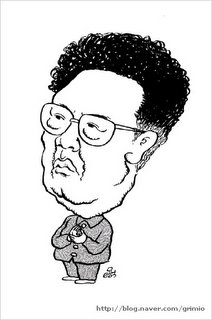1.Roh said he would closely look at whether North Korea’s nuclear test has any influence on wartime command transfer. He also said it is true that North Korea’s test created a situation where we have to reconsider our engagement policy but we have to be very careful to conclude that the engagement policy resulted in the nuclear test.
Roh pointed out the effectiveness of the engagement policy, saying the policy helped lessen people’s anxiousness and stabilize the economy by easing off tensions between the two Koreas.
He didn’t clarify his position on whether to continue Mt. Kumkang tour and Kaesung business.
2. Most ruling party leaders say Kaesung and Mt. Kumkang business should continue. Meanwhile GNP leaders argue that the two businesses should be put on hold because the businesses practically provide hard currency to the North.
3. President Roh met with ruling and opposition party leaders and agreed to respond to the crisis in a bipartisan manner.
4. Asked whether North Korea’s nuclear test was successful, Song Min-soon said it would take two weeks to make a final conclusion.
5. The Ministry of Science and Technology is said to revise the earthquake magnitude from 3.58 to 3.9. The Ministry, however, still sees the scale a bit small for a nuclear test explosion.
6. The Grand National Party blamed the test on government’s weak stance toward the regime, asking Roh’s apology and step-down of the cabinet members. Party leader Kang Jae-seop asked for a whole new North Korean policy with the reshuffle of current security officials. “We have given North Korea more than W6000 bn in assistance but the North responded to that with firing missile and the nuclear test.” He also argued to stop all exchanges with North Korea including humanitarian aids.
GNP floor leader Kim Hyung-o said it was absolutely wrong to blame the US for the nuclear crisis, and it was North Korea’s responsibility, not the US’s responsibility. “North Korea’s nuclear test clearly shows the government’s engagement policy is flawed so we have to immediately suspend all inter-Korean economic cooperation until the North gives up nukes.”
7. Calls are coming to local banks from anxious clients asking whether the current situation has any impact on their assets in the bank. However local banks say there is not much actual change in capital flow.
8. Rodong Sinmun, North Korea’s party paper, didn’t mention on its nuclear test on its editorial of October 10, marking the 61st anniversary of Rodong Party.
9. Uri Party leader Kim Geun-tae said it would be wrong to give up engagement policy, clearly signaling his opposition to a proposed whole new North Korean policy. “Mt. Kumkang tour and Kaesung business shouldn’t be suspended.” “North Korea’s nuclear test is wrong and unacceptable….but inter-Korean exchange and cooperation should be separated from the current situation.
10. Kwon O-kyu said, “the implication of North Korea’s nuclear test on our economy could be more serious than we thought depending on course of events including possible punitive measures by the US and the UNSC.” “The government is trying to stabilize economic sentiment by showing a swift response and running a special force to take care of economy.”
11. As of 10:00 am this morning, the Korean stock market came back to normal with the Kospi index of 1325.67, up 6.27 from yesterday and the junior retail-driven Kosdaq index of 547.27, up 8.17 from a day earlier. Retail investors, however, still continue their selling spree by getting rid of W53.2 bn worth of shares while foreign investors and institutions are buying out stocks.
12. Former President Kim Young-sam argued to scrap sunshine policy as well as engagement policy and to stop all inter-Korean economic cooperation projects with North Korea.
13.‘People for Peace and Unification,’ a progressive group, held a press conference to strongly protest against NK nuclear test. However the group voiced concern over a possible sanction on North Korea, saying “US and Japan-led sanctions on North Korea will intensify the crisis on the Korean peninsula and in northeast Asia by extension,” and “the prime reason for North Korea’s test is US’s hostile policy toward the North.”
14. Defense Minister Yoon Kwang-woong said “we have a very tough way to go before we can solve North Korea nuclear problems and we should make a consistent effort to solve the problems.”
15. The Korea Institute of Nuclear Safety in Daejon is running 37 monitoring stations nationwide which are operating around the clock to check out any nuclear leakage. The automatic monitoring system is checking up the radioactive level in every two minute.
16. The Council of Companies in Kaesung Industrial Park urged the government to actively provide safety measures to ensure business as usual. It said all businesses in Kaesung should not be affected by any political factors and the production system should continue.
17. The government announced that there is no significant movement spotted in the economy including the financial sector, export, price of raw materials and commodities after carefully monitoring overall economic conditions in the wake of yesterday’s test.



